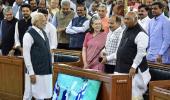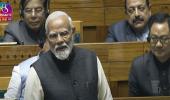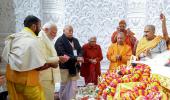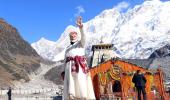Prime Minister Narendra Modi said on Friday that he has already begun preparing a road map for his third term and has taken suggestions from more than 15 lakh people, asserting that the new India "will now work with super speed".

Addressing the Times Group's ET NOW Global Business Summit, Modi said that for nearly one and a half years he has been putting in place details of new schemes to give new pace to the country's development and curb poverty.
Giving an account of the massive transformation in the pace of work and the change in governance style he has effected in his 10 years compared to the preceding decade-long rule of the Congress-led UPA, he said his third term will witness even bigger decisions.
"I am making a full road map (of third term)... I have taken suggestions from over 15 lakh people in different ways. This is the first time I am telling this. The work is on and it will take a final shape in 20-30 days. New India will work with this super speed. This is Modi's guarantee," he said with characteristic confidence, drawing cheers from the audience.
The prime minister referred to the "white paper" his government has brought in Parliament to highlight the alleged mismanagement of the economy and other governance issues, including national security, and changes it has brought to flay the previous dispensation.
The policies of the 10 years before his government came to power in 2014 would have pauperised the country, he said, adding that he chose rashtraneeti over rajneeti by not releasing the white paper at that time as it would shaken people's confidence in the country's abilities.
The white paper would have served him politically but he chose national interests over politics, he said.
His government has rescued the country from very dire straits to take it to this position, he said, asserting there were never such positive sentiments about India's abilities and success as being seen now.
A virtuous cycle has begun as the country's growth rate and exports are consistently high and its fiscal deficit and current account deficit are declining.
"It's a time when our productive investment is at a record high and inflation is in control," he said, adding that it is also a time when the number of critics is at an all-time low.
His government's interim budget has drawn all-round praise for shunning populism, he said.
Modi asserted that he keeps far away from the cheap politics of spending public money extravagantly for a few votes.
Attacking the previous Congress governments, he said the slogan of garibi hatao was raised for seven decades but poverty did not decline. Whereas an industry in the name of removing poverty cropped up and people enriched themselves by offering suggestion from air-conditioned room on how to do that, he said.
"For years, they debated over wine and cheese on the formula to remove poverty but it did not decline," he said, asserting that when a poor person's son in him became the prime minister in 2014, he shut down that industry.
His government lifted 25 crore people out of poverty, he noted.
In a swipe at political parties offering free electricity in the states ruled by them, he said without elaborating that their handling of the issue would bring ruins and cited his government's programme for rooftop solar power to assert that this will help people immensely.
In many sectors more work has been done in the last 10 years than in the previous decades since independence, the prime minister said.
More than 650 km metro tracks were laid since 2014 while it was only 250 km before that.
Tap water reached only 3.5 crore households till 2014 but his government's Jal Jeevan Mission has taken it to 10 crore houses, he said.
Over 40,000 km rail tracks have been electrified in the 10 years of his government while the figure was only 20,000 km till then, he said.
Then he asked, "Tell me, is there any contest." He then added in a lighter vein, "I am not talking of May." The Lok Sabha results are expected to be declared in May.
Modi said there is discussion now in every development expert group that India has transformed in the last 10 years.
"In Davos, which is like a Kumbh Mela for business people, also there was great enthusiasm for India. Someone there said India is an unprecedented success story, someone said India's digital...infrastructure is touching new heights and someone said there is no place where India does not have influence," Modi said.
He said that in any country's development journey, a time comes when all circumstances are in its favour and when that country strengthens itself for many centuries to come. "I see that time for India now," he added.
"This is the time when opportunity and incomes are both rising and poverty is declining. This is the time when consumption and corporate profitability are both rising and there is record reduction in bank NPAs (non-performing assets). This is the time when production and productivity are increasing and this is the time when our critics are at an all-time low," the prime minister said.
He said his government's policy is stability, consistency and continuity.
Modi said inflation was a side-effect of overspending and his government followed the mantra of 'money saved is money earned' for time-bound completion of projects.
"We valued taxpayers' money by completing big projects like Parliament building in record time, and earned money even from scrap removed from government office in cleanliness exercise," the prime minister said.










